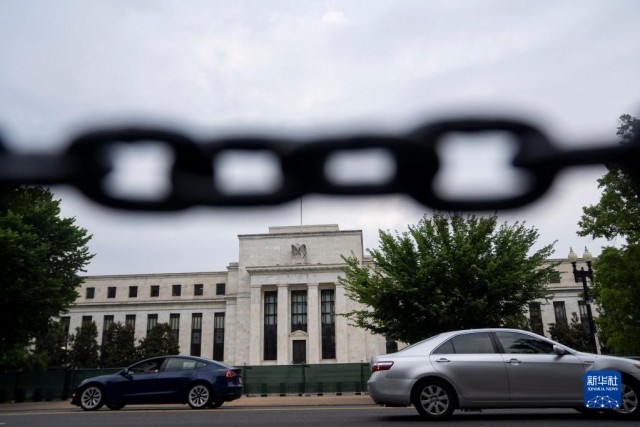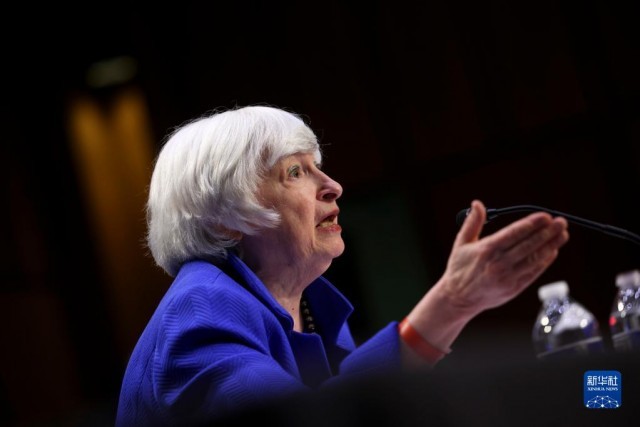How can a strong US dollar "strong earthquake" US dollar hegemony chaos the world?
Author:Xinhuanet Time:2022.09.27
Xinhua News Agency, Beijing, September 26 (International Observation) How does a strong US dollar lead the market "strong earthquake" US dollar hegemony?
Xinhua News Agency reporter Xu Chao
The Federal Reserve Commission has recently decided to continue to radiate 75 basis points, promoting the US dollar to other currency exchange rates to continue to rise, causing turbulence in the international financial market.
International observer believes that, with the promotion of US monetary policy, the US dollar has continued to strengthen its destructive effects worldwide. Taking monetary policy and exchange rate as an important tool, the United States has continuously pushed global inflation and debt levels with the help of the US dollar hegemony, squeezing monetary policy space from various countries, and pushing the world economy to decline by driving global tightening tide.

This is the Federal Reserve building taken in Washington, USA on June 22. (Photo by Liu Jie, a reporter from Xinhua News Agency)
Affects exchange rates to advance the level of inflation in other countries
Since the Fed started the interest rate hike cycle in March this year, the US dollar has continued to rise to other currency exchange rates, and accelerated before and after the US interest rate hike node.
On September 22, the Japanese yen approached the 146 to 1 mark in the US dollar exchange rate. It hit a new low in 24 years, prompting the Japanese Ministry of Finance to announce intervention in the exchange market to prevent the yen from devaluation. This is the first time that the Japanese government has intervened in the foreign exchange market since June 1998. The yen has depreciated by about 25%of the US dollar this year.
On the same day, the Han Dynasty fell below the 1400th of the US dollar exchange rate, setting the lowest record since March 31, 2009.

This is the Korean won and USD banknotes taken in Seoul, South Korea on September 22. (Photo by Xinhua News Agency reporter Wang Yiliang)
According to the Wall Street Journal, the Intercontinental Exchange Index, which measures the exchange rate of the United States and major trading partners this year, has risen by 14%, which is the most powerful year since the index was launched in 1985. The exchange rate of the euro, yen and pounds to the US dollar has fallen to decades, and the currency of emerging markets has also been severely damaged.
Analysts believe that the exchange rate "scissors" brought by the strong dollar are "harvesting" the world through inflation. Regardless of developing countries or other developed countries, once the local currency depreciates against the US dollar, imports of commodities that are priced in US dollars are inevitable to increase their own inflation; for the United States, imports of other countries in imports have become cheap, and the appreciation of the US dollar has thus alleviating domestic inflation in China. One of the means.
Taking the euro zone as an example, the August inflation rate was 9.1%year -on -year, far exceeding the European Central Bank's 2%mid -term inflation target. The inflation rate of nine countries in the 19 member states of the euro zone is calculated on a double digit at an annual rate. After the depreciation of the euro against the US dollar, Europe was imported from the US dollar and semi -finished products from the US dollar at a higher price, and bears the inflation pressure from the United States.
"Wall Street Journal" commented: "In terms of curbing inflation, the strong dollar brought a smooth wind to the United States, but putting pressure on other parts of the world."
The wave of interest rates deepen economic recession expectations
Under the pressure of inflation and depreciation of the local currency, many countries have to follow the pace of the Federal Reserve to increase interest rates. In the words of the Bank of America's chief economist, Eshan Harris, the world is in a "interest rate hike competition".
Before and after the Federal Reserve ’s interest rate hikes, Sweden, Switzerland, Britain, and South African Bank all raised interest rates. Among them, the Swiss Bank's interest rate hike marked the end of the 10 -year negative interest rate era in Europe, and Japan became the only major economy to maintain negative interest rates.
In November last year, the European Central Bank President Christina Lagarde had claimed that interest rates in the euro zone in 2022 were unlikely to increase, and the European Central Bank announced the second interest rate hike this year. Euro currency's maximum interest rate hikes have been born.

This is the euro sculpture and a fountain sculpture shot in Frankfurt, Germany on September 8. (Photo by Xinhua News Agency reporter Shan Weiyi)
In Asia, the Philippines and the Indonesian central bank announced on the 22nd that they announced their interest rate hikes 50 basis points.
According to statistics from Bloomberg, the central banks of about 90 economies have increased interest rates since this year, and half of them have recorded at least 75 basis points. This has also set the widespread austerity record for global monetary policy over the past 15 years. Crisa Guha, head of the international strategy and investment group central bank of the United States, believes that the United States is the decisive factor driving global interest rate hikes. Central Bank.
International observer believes that the Federal Reserve has stated that it will ignore all to curb inflation and realize the economic interests of the United States. In the case of passively follow the pace of the Federal Reserve, the risk of world economic recession has also increased significantly.
Morris Obst Feld, the former chief economist of the International Monetary Fund, believes that most central banks move in the same direction and may strengthen their tightening policies, which exacerbates risks.
The research report released by the World Bank in mid -September believes that the central bank of the world is raising interest rates with the degree of synchronization that has not been seen in the past 50 years. This trend may continue until next year, causing the world economy to decline, and give emerging markets and developing economies. Bring a financial crisis and cause lasting damage.
In the words of the former Federal Reserve Director Kevin Vosh, "All the conditions of the world's economic recession are already available today."
Receiving liquidity exacerbates global debt risk
Debt risks are another important manifestation of the global harm of the US dollar hegemony. The rapid turn of the Fed's monetary policy has led to a significant tightening of global liquidity. Borrowing preferences have shifted from irritating to restrictions. Capital began to return to the United States. Many emerging economies with debt are difficult to draw from debt. US Treasury Secretary Yellen previously acknowledged that the appreciation of the US dollar may bring challenges to emerging economies, especially those economies with a large number of US dollars for debt.
On September 28, 2021, US Finance Minister Yellen attended a hearing of the Senate Bank, Housing and Urban Affairs Committee in Washington. (Posted by Xinhua News Agency, POOL Picture/Kevin Dicic)

Lagram Lazan, a professor of finance at the University of Chicago, said that under low interest rates and new crown epidemic factors, many countries have increased a lot of debt in the past two years, and now risks are difficult to control.
After the Federal Reserve raised interest rates, the 10 -year Treasury bond yield of US 10 -year Treasury bonds soared to 3.69%after the key benchmark of the global borrowing cost, the highest level since 2011. According to the latest data from the International Financial Association, emerging economies will have $ 83 billion in government debt to expire by the end of next year. After the dollar stronger, the US dollar debt borders the emerging economy government and enterprises will be more expensive.
In an interview with the British "Financial Times", the chief economist of the World Bank warned in an interview with the Financial Times that the debt risks of emerging economies were particularly prominent. Compared with the international financial crisis, some low -income countries are more vulnerable and may fall into debt dilemma in the background of global tightening.
- END -
Counselor Yin Xiyue said this China, they don't do it anymore

Officials of Korean officials said that the era of export economy is over through ...
"Islamic State" claims to attack the Russian embassy in Afghanistan, Gutres strongly condemn
[Global Times Special Reporter Cheng Yijun] The Russian Embassy in Afghanistan suffered an explosion attack at 11 am on the 5th, causing 8 people including two Embassy Pavilion staff to die and many p